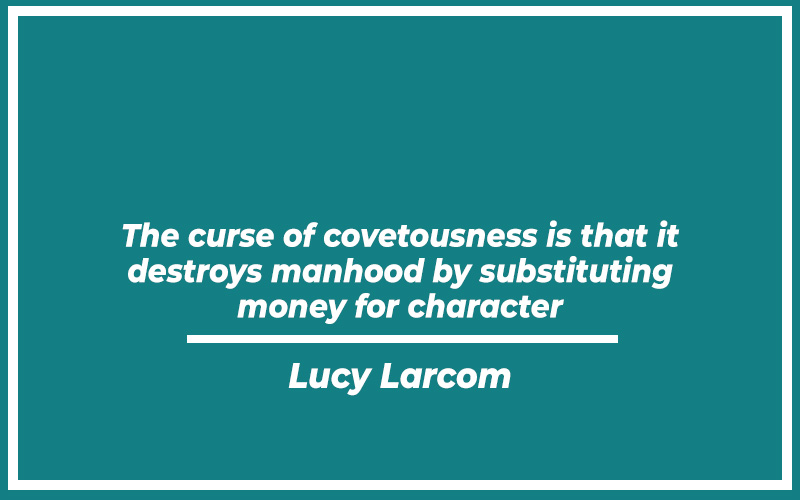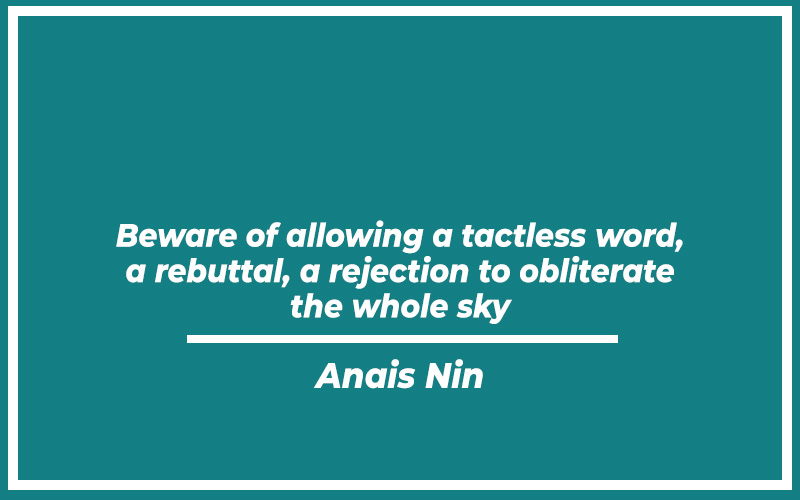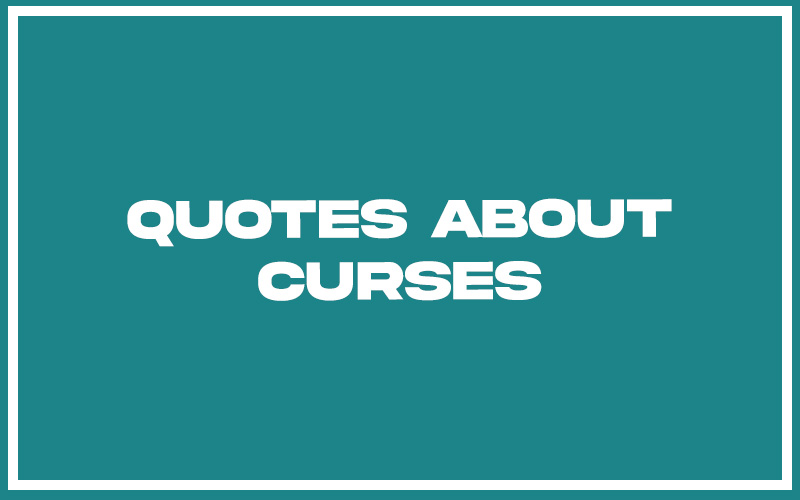If you’ve ever been fascinated by the darker, more mystical side of folklore and storytelling, then quotes about curses will certainly capture your imagination.
These quotes explore the concept of curses — the idea that a word or a wish can bring about misfortune or doom as a form of supernatural justice or malice.
As you delve into these quotes, you’ll find they weave together the fears and beliefs of different cultures, revealing how deeply the idea of curses is embedded in human storytelling and thought. They challenge you to consider the power of words and the weight of our intentions.
Best Quotes About Curses

“The curse of covetousness is that it destroys manhood by substituting money for character.” – Lucy Larcom
Lucy Larcom’s quote critiques the moral decay that can result from prioritizing wealth over character. She highlights how the pursuit of material gains often leads to a loss of ethical values, reshaping an individual’s identity around what they own rather than who they are.
This statement warns against allowing greed to undermine our fundamental human qualities, urging a reevaluation of priorities to favor moral integrity over financial success. It serves as a poignant reminder of the enduring importance of character in a world increasingly dominated by materialism.
Also Read: Wind Quotes (with Explanation)
“Perhaps love’s greatest gift—that it is indeed unconditional—is also its greatest curse.” – Kristin Armstrong
Kristin Armstrong’s reflection on love’s nature points out the paradox that while unconditional love is profoundly rewarding, it can also lead to significant emotional pain. This quote explores the complex dynamics of love, where its depth makes us profoundly vulnerable to hurt.
Armstrong suggests that the unconditional aspect of love, which makes it so valuable, also exposes us to the possibility of deep disappointment and suffering, making it a double-edged sword in human relationships. It invites a deeper understanding of love’s powerful impact on our lives, both positive and negative.
“The curse of the law! Most of my fellow citizens are the sorry consequences of uncommitted abortions.” – Karl Kraus
Karl Kraus’s scathing critique uses vivid language to express his disdain for the failings of societal and legal systems, which he sees as producing undesirable outcomes for citizens. This quote challenges us to scrutinize the effectiveness and moral standing of our governance structures, suggesting that they often do not fulfill their roles in nurturing and protecting society’s members.
Kraus’s metaphorical use of “uncommitted abortions” provocatively highlights the severity of his critique, urging a reformation of laws and policies to better serve the populace.
“Coercive power is the curse of the universe, coactive power, the enrichment and advancement of every human soul.” – Mary Parker Follett
Mary Parker Follett makes a compelling distinction between coercive and coactive power, condemning the former as destructive and praising the latter as beneficial. She argues that using force to achieve goals ultimately harms societal progress, whereas collaborative power promotes mutual growth and enrichment.
This quote advocates for a shift towards more empathetic and cooperative forms of interaction that respect individual autonomy and encourage collective advancement, which she sees as essential for the true progress of humanity.
“Traveling carries with it the curse of being at home everywhere and yet nowhere, for wherever one is some part of oneself remains on another continent.” – Margot Fonteyn
Margot Fonteyn articulates the existential dilemma of frequent travelers, who, while adaptable, often lack a permanent sense of belonging. This quote captures the essence of what it means to be a global citizen—comfortable in many places but not wholly at home in any.
Fonteyn’s insight reflects on the internal conflict experienced by those who live between worlds, suggesting that this lifestyle, while enriching, also fragments one’s identity across geographies, creating a unique form of isolation.
“Superficiality is the curse of the modern world.” – Matthew Kelly
Matthew Kelly decries the modern world’s emphasis on surface-level interactions and shallow pursuits, identifying them as a significant societal flaw. He argues that this focus on superficiality detracts from meaningful human connections and intellectual depth, leading to a culture lacking in substance.
Kelly’s critique invites us to reflect on our own interactions and cultural engagements, urging a return to values that prioritize depth, authenticity, and genuine engagement over fleeting, surface-level exchanges.
“The Farfield Curse is a story you’ll want to pick up, but not put down!” – Kaza Kingsley
Kaza Kingsley’s comment on “The Farfield Curse” not only praises the book’s engrossing nature but also metaphorically alludes to the idea of a curse that is both captivating and burdensome. This statement highlights how certain narratives, much like literal curses, can deeply affect us, holding our attention and perhaps even impacting our perspective long after the story ends.
Kingsley’s remark underscores the power of storytelling and its ability to enchant and ensnare, reflecting on the dual nature of engaging narratives that captivate us to the point of obsession.
“Cursed (although I curse myself) be the hands that formed you!” – Mary Shelley
Mary Shelley’s quote from “Frankenstein” encapsulates the torment and regret of Victor Frankenstein as he reflects on his creation. This poignant expression of self-cursing reveals the deep inner conflict experienced by someone who realizes the catastrophic consequences of their actions.
Shelley’s words echo through the ages as a somber reminder of the burden of responsibility and the irreversible nature of certain decisions, highlighting the theme of creation and consequence that is central to the novel.
“For centuries, it was believed that disabled people like me were living under a curse inflicted by God. I prefer to think that everything can be explained another way, by the laws of nature.” – Stephen Hawking
Stephen Hawking’s perspective challenges ancient superstitions surrounding disabilities, suggesting a shift towards understanding through science rather than mythology. This quote reflects his advocacy for rational thinking and the empowerment of individuals with disabilities.
Hawking encourages a view of the universe governed by natural laws, where disabilities are not curses but part of the human experience, deserving respect and understanding.
“Intolerance has been the curse of our country.” – James Larkin
James Larkin highlights the destructive impact of intolerance on society, labeling it as a curse. His words remind us of the importance of embracing diversity and fostering an inclusive environment.
Larkin’s commentary urges societies to reflect on the long-term effects of intolerance and to strive towards acceptance and unity, promoting a more harmonious social fabric.
“The internet has been a boon and a curse for teenagers.” – J.K. Rowling
J.K. Rowling addresses the dual nature of the internet in modern society, especially for young people. While it offers vast information and connectivity, it also poses risks and challenges that were previously non-existent.
This quote prompts a discussion on the need for balance and critical thinking in the digital age, urging both caution and engagement with this powerful tool.
“Bless those who persecute you; bless and do not curse.” – The Bible, Romans 12:14
This biblical instruction advocates for responding to persecution with kindness rather than retaliation, emphasizing the moral high ground and the strength of character it takes to bless in the face of adversity.
It’s a call to transcend instinctual reactions and embrace a more compassionate approach, which can lead to peace and reconciliation.
“The curse of a journalist is that he always has more questions than answers.” – Bill Keller
Bill Keller’s reflection on journalism pinpoints a fundamental challenge within the profession: the relentless pursuit of truth that often leads to more questions than resolutions.
This quote underscores the critical, inquisitive nature of journalism and its role in continuously probing and questioning to inform the public, despite the inherent uncertainty that this process may involve.
“I would as soon leave my son a curse as the almighty dollar.” – Andrew Carnegie
Andrew Carnegie’s statement criticizes the potential corrupting power of wealth when left as an inheritance without guidance or purpose. He challenges the conventional wisdom that wealth is an unequivocal blessing, suggesting that, without the proper moral and ethical framework, it could be as detrimental as a curse.
This quote prompts reflection on the responsibilities that accompany wealth and the importance of fostering virtues over mere financial gain.
“A curse is a mirror that reflects back to you the harm you’ve inflicted.” – Alice Hoffman
Alice Hoffman’s quote suggests that curses are not just supernatural afflictions but also consequences of one’s actions reflecting back on oneself. It posits that harm done to others might return to the perpetrator in equal or amplified measure.
This perspective invites introspection and cautions against malevolent behavior, promoting a moral understanding that one should strive to do good or risk facing the repercussions of their negative actions.
“Curses are often self-imposed; we set limitations we cannot see.” – Dean Koontz
Dean Koontz explores the idea that curses can be self-created through mental barriers and negative beliefs. This quote implies that the limitations we experience are often not external constraints but internal convictions that hinder our potential.
Koontz encourages breaking free from these mental confines to realize our full capabilities, suggesting a powerful shift from self-doubt to empowerment.
“To live with a curse is to be human; every choice has its shadow.” – Neil Gaiman
Neil Gaiman’s reflection considers the inherent complexity of human choices, where every decision carries potential negative consequences, akin to living under a curse.
This quote underscores the unavoidable nature of trade-offs and repercussions in life, highlighting the maturity and wisdom required to make decisions knowing they might have far-reaching effects.
“A curse is only a curse if you believe it is.” – Stephanie Garber
Stephanie Garber’s quote delves into the power of belief in determining one’s reality. It suggests that the impact of a curse depends significantly on the affected person’s acceptance of it as real or potent.
This perspective empowers individuals to reject negative notions and break free from the psychological effects of supposed curses, emphasizing the control we have over our perceptions and reactions.
“Every curse carries its own cure.” – Unknown
This proverbial saying provides a hopeful outlook on curses, suggesting that within every negative situation lies the potential for remedy and redemption.
It encourages looking for solutions and positive aspects even in seemingly dire circumstances, promoting resilience and resourcefulness in facing life’s challenges.
“Breaking a curse might free you, but it doesn’t change what you are.” – Zoraida Córdova
Zoraida Córdova highlights that while breaking a curse can be liberating, it does not alter the core essence of a person. This quote speaks to the enduring nature of one’s identity and character, regardless of external changes or freed constraints.
It underscores the importance of self-acceptance and growth, rather than expecting liberation from a curse to transform personal flaws or virtues.
“The curse of mortality is knowing time is always against us.” – Unknown
This quote reflects on the existential reality of human life bound by time, viewing it as a curse of mortality.
It captures the urgency and poignancy of living in the shadow of time’s relentless advance, urging us to make the most of our moments and to pursue meaningful experiences in the awareness of life’s fleeting nature.
“The only curse that exists is the one we believe.” – Wayne Dyer
Wayne Dyer’s quote challenges the notion of external forces determining our fate, positing that the real power lies in our beliefs. He suggests that what we perceive as a curse is often a manifestation of our own fears and negative thoughts. This perspective empowers individuals to reshape their reality by changing their mindset, emphasizing the transformative power of positive thinking and self-belief. It encourages us to dismiss superstitions and victimhood, advocating for a proactive approach to life where we create our outcomes based on how we choose to perceive and react to our circumstances.
“Curses are like chickens; they always come home to roost.” – Robert Southey
Robert Southey’s proverbial insight connects the idea of curses with the inevitability of consequences returning to their originator. This quote underscores the concept of karma, where actions, good or bad, eventually find their way back to the person who initiated them. It serves as a cautionary tale about the nature of ethical reciprocity and personal accountability, reminding us that our deeds, much like chickens, settle where they originate, prompting a mindful approach to our actions and their potential repercussions.
“A curse is a blessing whose purpose we have not yet understood.” – Alice Walker
Alice Walker offers a reflective and optimistic view on the challenges labeled as curses, suggesting that they may serve a deeper, beneficial purpose in our personal growth and understanding. This quote encourages a reevaluation of difficult situations, proposing that what we initially perceive as negative may actually hold valuable lessons and opportunities for development. It invites us to look for the hidden blessings in our trials, fostering a mindset of growth and resilience that can transform perceived curses into sources of strength.
“Curses, like chickens, come home to roost.” – Susanna Clarke
Susanna Clarke echoes a traditional saying, highlighting the inevitability of facing the consequences of one’s actions. This quote is a reminder of the old wisdom that no deed goes unnoticed, and eventually, everyone must confront the outcomes of their choices. It stresses the importance of integrity and caution in our behavior, reinforcing the idea that our actions have a way of returning to us, for better or worse.
“To remove a curse, you must understand the nature of the blessing within it.” – Michael Meade
Michael Meade’s quote suggests that curses may contain hidden positives, only revealed through deep understanding and introspection. This approach to challenges as opportunities for discovery and transformation encourages a deeper engagement with our struggles, looking beyond the surface distress to uncover potential gifts. It advocates for a profound paradigm shift in dealing with adversities, where recognizing and embracing the embedded blessings can lead to liberation and enrichment.
“The curse of ignorance is that those who have it are least likely to recognize it.” – Plato
Plato’s observation on ignorance as a curse speaks to the difficulty of overcoming a lack of knowledge when one is unaware of their own deficiencies. This quote underlines the dangers of ignorance, particularly the barrier it poses to learning and self-improvement. It challenges us to continuously seek knowledge and remain open to learning about ourselves and the world around us, emphasizing the need for self-awareness and the pursuit of wisdom as antidotes to ignorance.

“Beware of allowing a tactless word, a rebuttal, a rejection to obliterate the whole sky.” – Anais Nin
Anais Nin’s cautionary words warn against letting negative interactions or experiences overshadow the broader joys and opportunities of life. This quote emphasizes the importance of perspective and resilience, encouraging us not to let transient curses—like harsh words or setbacks—dominate our outlook or emotional state. It promotes a balanced view of life, where negative moments are seen in context rather than allowed to define our entire experience.
Also Read: Kodak Black Quotes (with Explanation)
Final Thoughts
Quotes about curses serve as a window into the complexities of human belief systems and the narratives that have shaped societies.
As you reflect on these sayings, let them intrigue and remind you of the potent blend of fear and fascination that curses can evoke.
Remember, these quotes aren’t just about the supernatural; they offer insight into the human psyche and the cultural significance of curses throughout history. Let them inspire you to think more deeply about the legends and the lore that continue to influence our understanding of the unknown and the unseen.

